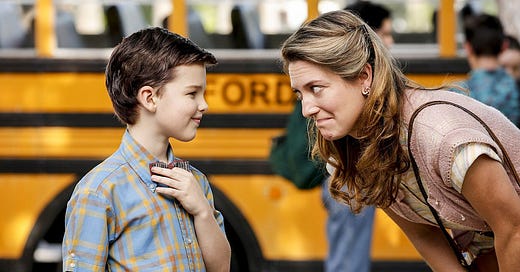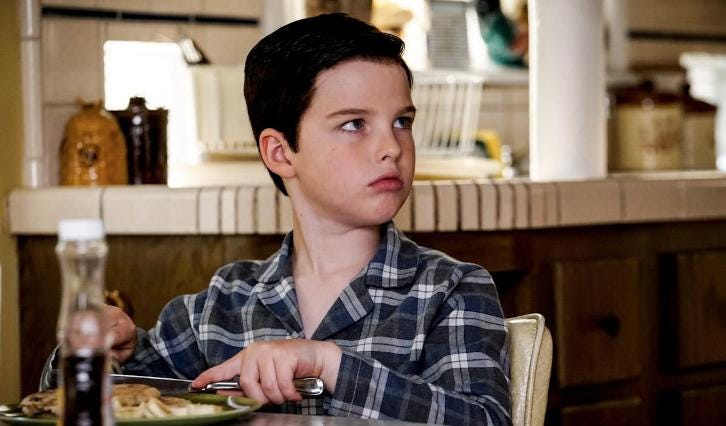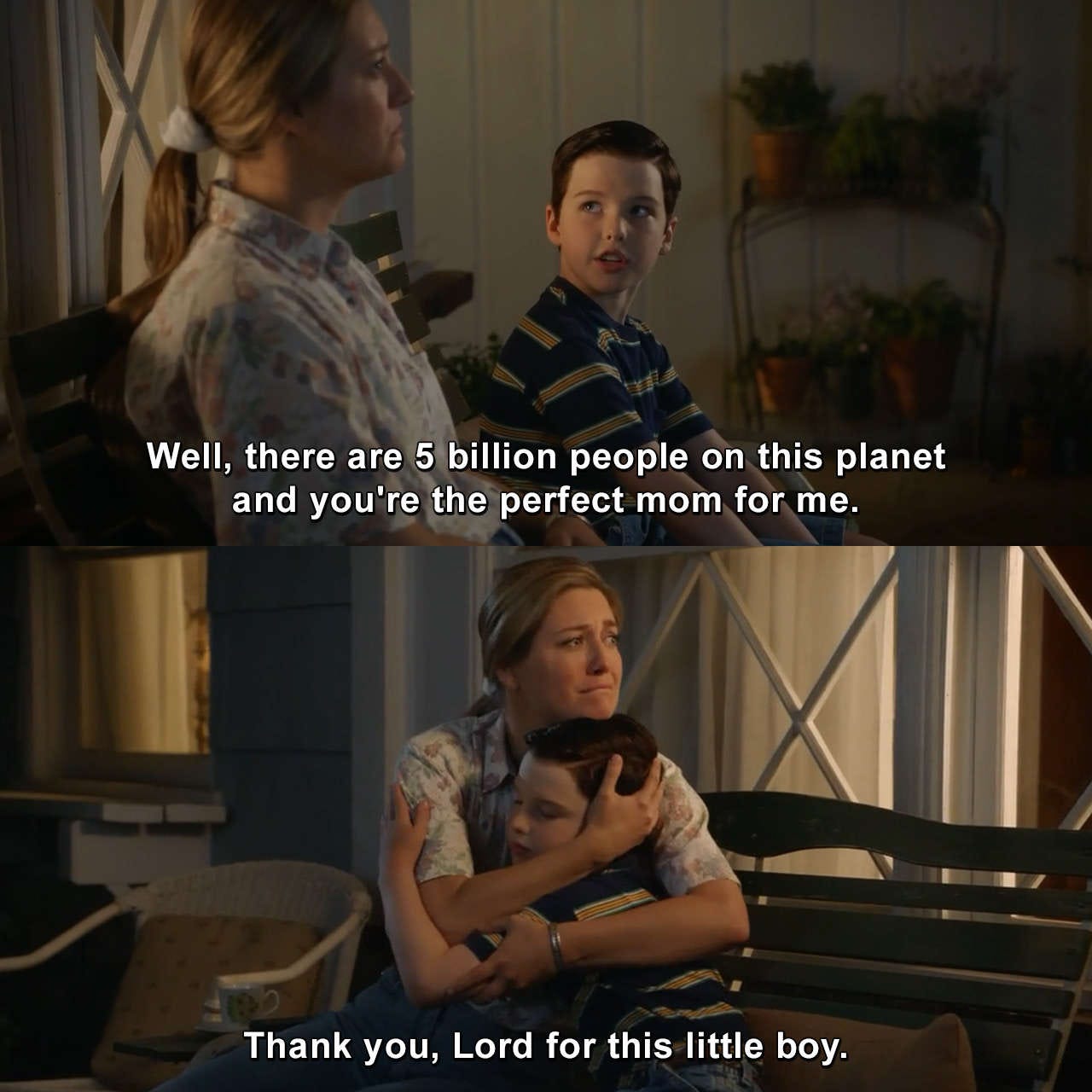I’m sorry.
I am secretly a bit of a fan of the sitcom ‘Young Sheldon’ (2017-present), a show about a boy genius who grows up to be the worst lead character in television history. Not in any post-ironic way either. It’s just a decent little show with interesting dynamics. The foibles of Dr. Sheldon Cooper are much less…frustrating when presented on a child.
‘The Big Bang Theory’ (2007-2019) has an earned reputation for being maybe the most inexplicable phenomena in recent history. A hit from the jump, the show earned 10 Emmys (including 4 for Jim Parsons) and regularly smashed its competition in the ratings. That’s not being glib. At its height, the show was averaging about 20 million viewers an episode. When the show finished in 2019, it had dipped to just over 17 million.
And for all of that, its reputation remains as one of the worst pieces of network programming in recent memory. At least, that’s the impression you get from the online critics, who turned on the show for a variety of reasons. Criticisms range from the understandable (the show’s depiction of neurodivergent people is…flawed) to the ridiculous (anyone complaining about the science – NERD), and anything in between.
People just do not like this show and are extremely loud about it. For my money, it’s about on the level of Friends, which it clearly seeks to emulate from the very first episode. It’s got some genuinely quite touching moments, particularly as it sheds the focus on Sheldon Cooper and allows itself to just be a true ensemble. But the end result is mediocre. It’s like popcorn – you can eat it all day long, but it’s not a meal.
The spin-off is charming to me.
There’s a lot to talk about on this show. For starters, the family casting is impeccable. While the underlying tensions of a prodigy child effect every dynamic on the show, everyone has amazing chemistry. Iain Armitage deserves special praise as a young star in the making for his ability in playing the title character and working through his inherent eccentricities to find the humanity beneath. Raegan Revord as his twin sister, Missy, is equally as compelling, particularly in recent seasons. Her ennui and anger at being the forgotten member of her family are inarguably tragic. She’s 13, and has attempted to run away twice.
Obvious standouts are Zoe Perry as Mary Cooper, and her mother, Annie Potts as Connie Tucker. Not only are they both hilarious as the hyper religious mother and fun grandmother, but they’re adept as playing the emotionality of their scenes. There’s a clear line of tension between the two that is regularly nodded to, but rarely addressed directly. It’s a fascinating choice that adds dimension to what could have been a fairly standard premise.
More than anything, however, tension can be felt in the very premise of a prequel. If you’re watching this with any familiarity with the original program, you’re always aware of the fact it’s hurtling heartbreak. One of the few genuinely touching throughlines of ‘The Big Bang Theory’ was the lingering affection Sheldon had for his deceased father, portrayed in both shows by Lance Barber. Despite committing adultery on his wife and destroying their family (more on that later), George Cooper Sr. was occasionally brought up as a source of fondness and pride by his son. After 6 seasons of the prequel show thus far, his eventual death via heart attack is a ticking timebomb under a very pleasant show.
Even the funniest parts of the show have an underlying bite. Georgie, the eldest son of George and Mary, is currently the father of baby Connie to his onetime fling Mandy. She’s about to turn 30, he’s just 18. Ages were obviously lied about from the jump, but while funny, the show can’t really decide if it’s fine with the arrangement or not. It’s weirdly realistic for a sitcom of this type to handle something so complicated. Thankfully, ‘Young Sheldon’ is better than the average sitcom.
Now that I’ve heaped a bunch of praised onto this generation’s answer to Roseanne, let me talk about the episode in question.
The second season of ‘Young Sheldon’ is host to one of the greatest episodes of network television in recent memory, and that’s ‘A Crisis of Faith and Octopus Aliens’. The basic premise is that the death of a local teen causes Mary Cooper to question her faith. There’s a a few jokes thrown in there, but the basic thrust of the episode is firmly centred on one woman’s shaken beliefs. It’s one of the most touching things I have ever witnessed.
To get the comedy out of the way, you’re basically dealing with the standard precocious child and wacky family situation. Sheldon questions the Church’s teachings and undermines the pastor with a pretty good, child’s version of standard annoying atheism. It bookends the episode in a cute way. But this is one of the least joke focused episodes in the series. While the meat does have a few funny moments, particularly around a drunken Mary, the show wants this to be a very special episode. Not in that it’s a PSA of any kind, but one that is clearly more character focused. But I should shout out the funniest line in the episode;
“Hug a stranger and tell them the Lord loves them. But not a child, that backfires on you – big time.”
Mary Cooper is a very complex character to centre this whole show around. Her faith is one of the foundations of the show, but while it never completely exits the show, it is regularly tested. This episode is basically her questioning how bad things happen to good people, but later seasons switch from “is religion good?” to “is the Church good?”, which explored a fundamentally different concept. But here, while the arc is tidy, it’s also shocking.
I don’t want to make it sound like ‘Young Sheldon’ is pro-religion. It doesn’t seem to consider the act of belief in any particular way, but more so focuses on outcomes. You’re not going to walk away from any episode wanting to join a Baptist ministry. However, it’s clear that religion is doing a lot to hold Mary Cooper, and by extension her family, together through extremely trying times. Whether it be money or marital, she returns to the comfort of the Church’s community, until it turns on her. That’s later, but the foundations for how she responds are laid here.
There’s a genuinely interesting thread going on underneath the show that the Church is ultimately a poor way to find community. That the ego of a certain type of Christian makes it impossible to rely on them. Even in this second season episode, you understand that it isn’t “God” that’s the problem. Regardless of the reality (and the show’s title character is an outspoken atheist), that doesn’t particularly matter if you find comfort. But it doesn’t. When Mary turns to Paster Jeff for support, his platitudes about leaning in harder to your faith mean nothing. Her attempts to go harder as a Christian don’t provide comfort. So she turns to her mother and past vices.
It comes to a head in a bar, when she admits to her mother that she cannot accept that this is God’s plan. She wants answers as to why a 16-year-old girl’s death is meant to be part of some glorious plan. Those answers are never coming. It's genuinely heartbreaking to watch this woman eschew her reassuring rituals and to see her family at a loss for how to help. While she tries to put on a happy face for the first half, the truth is that a child’s death has shaken her world.
And then there’s Sheldon.
Armitage gives a sensitive and sweet performance as a child who doesn’t understand why other’s feel the way they do, but in spite of this, wants to at least try and have empathy. While Missy and Georgie basically ride out their mother’s spiritual freakout without much active concern, Sheldon is aware that something is wrong and wants to help.
‘Young Sheldon’ often struggles between allowing this character to grow and evolve into something likeable, and the reality of where he actually ends up. And so you get this push and pull of empathy, where sometimes (like here) he’s able to read into a situation, and other times he just doesn’t understand. But in ‘A Crisis of Faith and Octopus Aliens’, I think we get the most likeable version of the character. He’s clearly struggling with finding appropriate responses, but in a way that feels appropriately childlike.
To extend from that, Sheldon and Mary’s bond is one of the sweetest things the show presents on a regular basis. It’s eerily reminiscent of Marge and Bart Simpson, with him being her “special little guy”. While later seasons allow Missy to more regularly be the voice of kindness, earlier on its Sheldon who has the emotional maturity to acknowledge her pain. He doesn’t believe in any of this, but he wants to make her feel better.
While Mary sits out on the porch, dishevelled and angry at the world, it’s her youngest son that comes to sit with her. He waxes poetic about gravity and the miracle of life, admitting that a creator is a possibility. It isn’t something the boy actually believes in, but just a way to console his mother. Earlier episodes may have had him verbally bristle against Mary’s assertion that “the Lord” might have given him the words to say, but this episode pushes that into the voiceover.
It's an incredibly touching episode for the simple fact that it doesn’t ask that anyone give up their stances. It isn’t a sermon, it’s a situation. Mary’s faith isn’t really affirmed by any this. The show makes it clear she finds purpose again via her son’s outreach, but more in a return to normalcy. They’re back in Church, but it remains a farse for everyone but her, and maybe even her. Later seasons will remove her from that community pretty much entirely for long stretches of time, but it never causes her to stumble the way this episode does. Her struggles become decidedly secular, even as the setting remains “sacred”.
I’m not aligned with any particular religion, but I often find myself wishing I had the security that comes with it. The assuredness that there’s a reason behind all of this. But it isn’t really “God” that’s at stake here, it’s family and safety. A hug from a child, or a kiss goodnight. ‘Young Sheldon’ is about the family, and while it is definitely in crisis at the moment, the love is always there.






